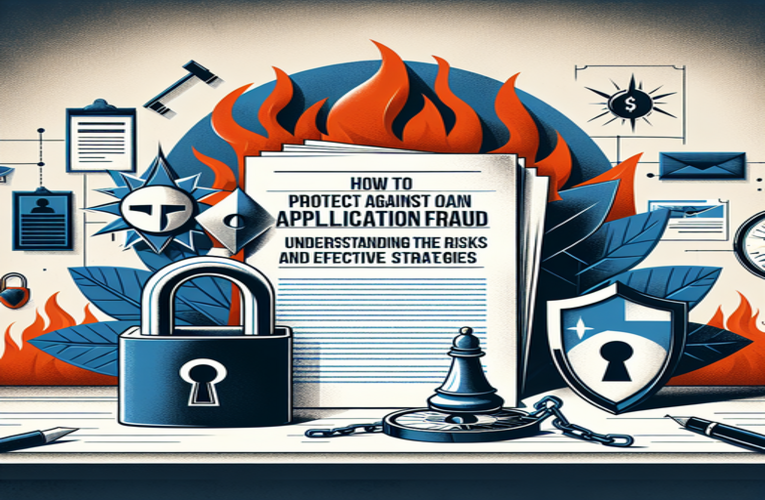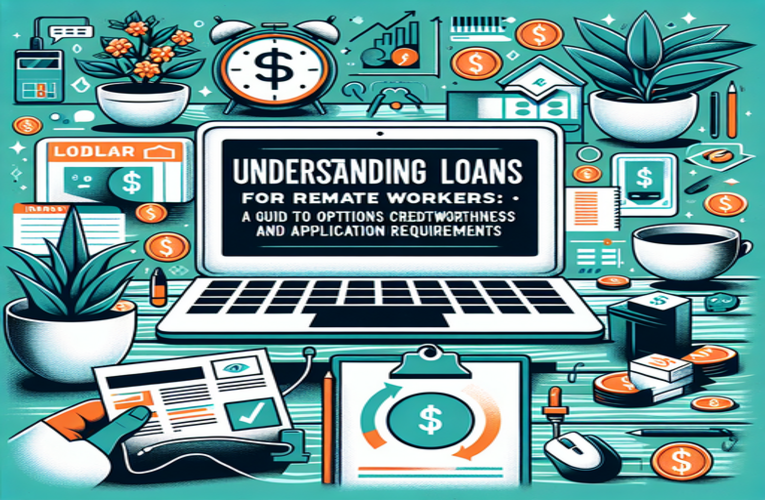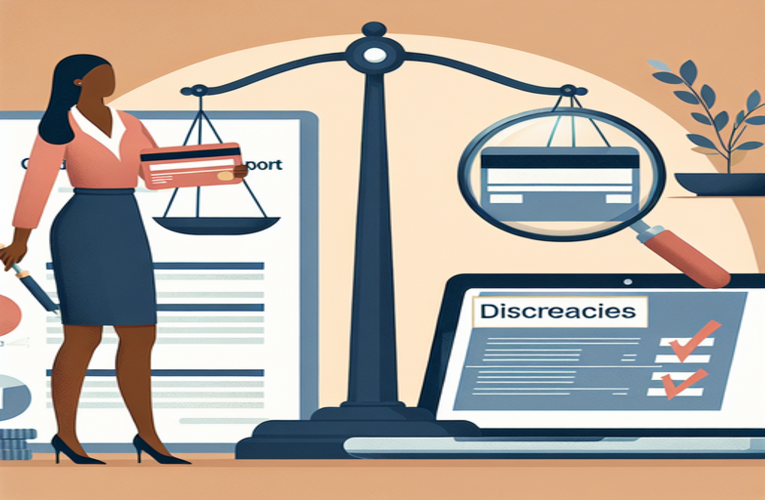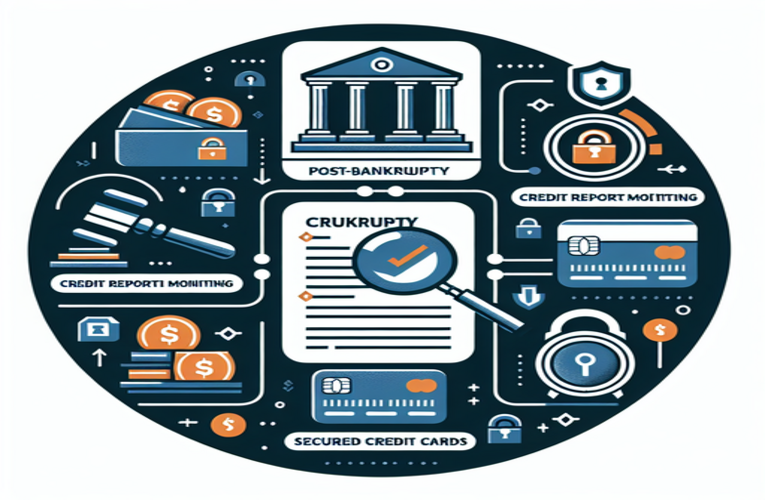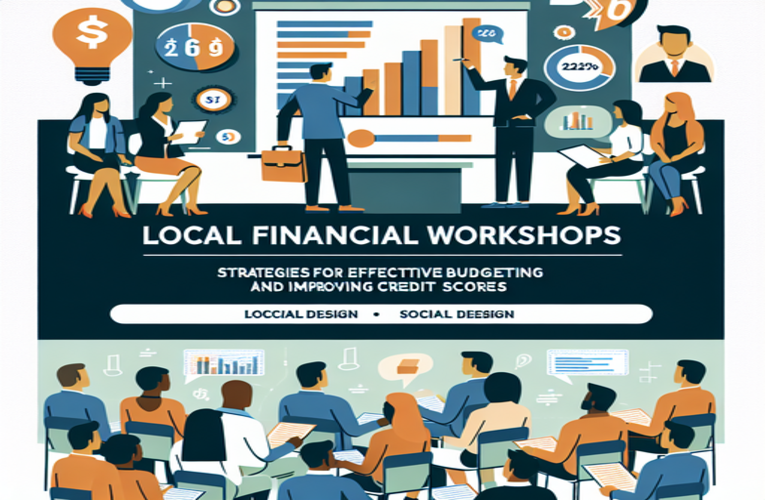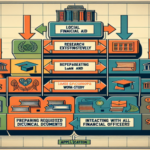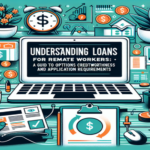Local financial workshops on credit management: strategies for effective budgeting and improving credit scores
In today’s fast-paced financial landscape, effectively managing loans and credit is essential for achieving long-term economic stability. Participating in local financial workshops on credit management can serve as a vital resource, empowering individuals with the necessary tools to improve their credit management skills. These community-based financial education programs delve into effective budgeting strategies, highlighting how local workshops can transform your approach to finances. By focusing on key areas such as budgeting fundamentals, goal setting, and resource access, these community initiatives facilitate a deeper understanding of financial management and promote financial literacy.
In this article, we will discuss:
- The core components of local credit management workshops that empower individuals to take control of their credit and loans.
- The benefits of participating in community-based financial training and how it can lead to improved financial health.
- Practical strategies for establishing financial goals, saving for emergencies, and enhancing overall credit scores through effective credit and loan management education.
With a focus on community support and accessible learning, this article aims to provide you with actionable insights to elevate your financial literacy and effectively manage credit and loans. By exploring financial education initiatives such as community workshops on credit and debt, we seek to empower you with the tools needed for successful credit management. Whether you’re a first-time borrower or someone looking to refine your existing knowledge, understanding these core principles can pave the way for a more secure financial future.
Table of Contents
Effective Budgeting Strategies from Local Financial Workshops on Credit Management
When addressing the effective management of loans and credits, participating in local financial workshops on credit management can be transformative. These community-based seminars empower participants by imparting essential budgeting techniques and enabling them to take charge of their financial pathways. For example, many of these educational gatherings concentrate on foundational subjects like efficient budgeting, guiding attendees on how to allocate their income judiciously. This skill is particularly critical for individuals managing multiple debts or loans. A well-structured budget, developed through local credit management classes, can significantly enhance savings potential; even minor adjustments in spending habits might lead to substantial financial gains over time. According to the Consumer Financial Protection Bureau, individuals who create a detailed budget are more likely to reduce unnecessary expenses and increase their ability to repay debts effectively. Engaging in these workshops not only provides practical budgeting tools but also fosters a supportive environment where participants can share strategies and experiences, further enhancing their financial literacy.
Key Elements of Community Financial Education Programs
- Budgeting Fundamentals: Educating attendees on effective budgeting techniques to manage loans and credits, including tracking expenses, distinguishing between needs and wants, and planning for variable expenses.
- Practical Applications: Establishing concrete financial goals, such as paying off a specific debt within a set timeframe, and maintaining commitment to these objectives through regular reviews and adjustments.
- Resource Access: Engaging with networks and valuable resources through community workshops, including access to financial advisors, support groups, and online tools tailored to individual needs.
- Credit Education: Understanding how credit works, the impact of credit scores on financial opportunities, and strategies to build or repair credit histories.
- Debt Management Strategies: Learning techniques to prioritize debts, negotiate with creditors, and explore options like debt consolidation.
In addition to budgeting fundamentals, these local financial workshops on credit management often prioritize practical applications, such as establishing concrete financial goals and maintaining commitment to these objectives. By developing a personalized financial strategy, participants discover ways to minimize superfluous expenses while prioritizing debt repayments. For example, attendees might learn about the debt snowball method, where they focus on paying off smaller debts first to build momentum, or the debt avalanche method, which targets debts with the highest interest rates to save money over time. Numerous attendees find resonance with the shared experiences presented during the sessions, gathering actionable insights that align with their unique financial circumstances. For instance, one participant recounted how implementing budgeting strategies and the debt avalanche method from a community workshop enabled her to eliminate a $5,000 credit card debt within 12 months, all without compromising essential living expenses. By tracking her spending, cutting unnecessary costs, and making extra payments toward her highest-interest debt, she not only reduced her debt but also improved her credit score significantly.
Benefits of Community Education on Credit Management
| Benefit | Examples | Impact |
|---|---|---|
| Improved Credit Scores | Better understanding of credit utilization, timely bill payments | Access to favorable financing conditions, lower interest rates |
| Financial Goal Setting | Establishing realistic financial objectives, such as saving for a down payment | Reduction in unnecessary expenses, achievement of long-term goals |
| Debt Reduction | Strategies to eliminate credit card debt, use of debt consolidation | Increased financial security, less stress from debt |
| Enhanced Financial Literacy | Understanding financial concepts like interest rates, inflation | Better decision-making, improved investment outcomes |
| Networking Opportunities | Connecting with financial experts, peers | Access to ongoing support, shared best practices |
Engaging in local financial workshops on credit management also opens doors to valuable resources and networks that may have been previously overlooked. Many organizations provide customizable workshops aimed at specific demographics, such as veterans, young adults, or low-income families, ensuring that the educational experience remains relevant and engaging. For instance, some workshops offer one-on-one sessions with financial counselors, access to free credit reports, and guidance on navigating student loan repayment options. Participants can therefore expect to see tangible improvements in their credit scores and acquire a deeper understanding of credit utilization, both of which are critical to securing favorable financing conditions in the future. Additionally, these workshops often provide information on avoiding predatory lending practices and recognizing financial scams, further safeguarding participants’ financial health.
How to Establish Financial Goals and Save for Emergencies Through Local Financial Workshops on Credit Management
Setting precise financial goals is essential for anyone aiming to enhance their economic well-being, particularly when navigating the complexities of credit management. Participating in local financial workshops on credit management serves as an effective strategy for outlining and accomplishing these objectives. These neighborhood financial education programs often offer practical instruction and valuable resources, targeting diverse audiences including families, students, first-time homebuyers, and retirees, thereby ensuring accessibility for all participants. For example, workshops may address challenges unique to college students managing student loans or provide guidance to retirees on fixed incomes aiming to maximize their savings. By tailoring content to specific needs, these workshops make financial planning relevant and actionable for everyone.
Defining Emergency Fund Goals
One of the foremost lessons from these localized seminars is recognizing the significance of an emergency fund as a financial safety net. It is generally advisable to save between three to six months’ worth of expenses for unforeseen circumstances, such as sudden job loss, medical emergencies, or unexpected home repairs. This could equate to anywhere from $5,000 to $15,000 depending on individual financial situations. Workshops provide a structured environment to establish these savings targets, enabling participants to monitor their financial progress closely while interacting with knowledgeable credit counselors and fellow attendees. For instance, instructors might demonstrate strategies for automating savings, like setting up automatic transfers to a dedicated savings account each month, making the process of building an emergency fund more manageable and less burdensome.
Importance of Budgeting
In addition to fostering emergency savings, local financial workshops on credit management place a strong emphasis on the importance of budgeting. Participants receive practical tools and techniques to categorize expenses effectively and amplify their savings. For instance, workshops may supply comprehensive budgeting templates or introduce budgeting apps like Mint or YNAB (You Need a Budget) that assist individuals in visualizing their financial habits. By gaining insights into their monthly expenditures—such as tracking how much is spent on dining out, entertainment, or utilities—attendees can pinpoint areas requiring enhancement. This process helps ensure they not only fulfill immediate obligations but also allocate funds toward debt repayment and savings goals, preparing them for unexpected financial challenges.
Understanding Credit Scores
Alongside saving strategies, participants in local financial workshops often engage in discussions about the importance of understanding credit scores—a critical element when making significant purchases such as homes or vehicles. These sessions frequently shed light on effective management of credit usage and methods to enhance credit scores. This knowledge positions individuals to secure favorable loan terms for future ventures. For example, understanding that maintaining a credit utilization rate below 30% can positively impact one’s credit score empowers participants to manage their credit cards more effectively.
Setting SMART Goals
Establishing specific, measurable, achievable, relevant, and time-bound (SMART) goals during workshops can significantly streamline one’s financial journey. This structured approach keeps individuals focused and committed to their objectives, facilitating the path toward financial stability. For instance, a participant might set a goal to save $10,000 for a down payment on a home within two years, breaking it down into monthly savings targets and tracking progress regularly.
Key Components Learned in Workshops
- Emergency Fund: Establish a savings fund of three to six months’ worth of expenses.
- Budgeting Techniques: Use tools like budgeting apps to categorize expenses and enhance savings.
- Credit Scores: Learn about managing and improving credit scores for better loan terms.
- SMART Goals: Define specific and achievable financial objectives.
- Debt Management: Explore strategies for reducing and eliminating debt.
Building a Supportive Community
Attending local financial workshops on credit management not only broadens your financial acumen but also connects you with a community committed to education and empowerment. The shared experiences and insights foster a supportive network, enhancing motivation and engagement in personal finance journeys. Participants often form study groups or accountability partnerships, helping each other stay on track toward their financial goals.
Workshop Benefits
| Benefit | Description | Outcome |
|---|---|---|
| Practical Guidance | Receive step-by-step methods and tools | Enhanced understanding of financial goals |
| Expert Interaction | Engage with knowledgeable credit counselors | Personalized advice for financial progress |
| Community Support | Network with like-minded individuals | Increased motivation and shared insights |
| Access to Resources | Utilize tools like budgeting apps and credit monitoring services | Improved financial management and planning |
| Financial Empowerment | Gain confidence in handling personal finances | Greater control over financial future |
Embarking on your financial path through local financial workshops on credit management can be transformative. By setting clear financial goals, developing a robust emergency fund, leveraging budgeting tactics, and understanding credit management, you can build a resilient financial future. Take the initiative today—participate in a workshop and begin crafting a solid foundation for both your immediate financial needs and unforeseen emergencies.
Understanding Credit Reports and Improving Credit Scores Through Local Financial Workshops
Navigating the realm of credit reports and credit scores can initially appear overwhelming, yet participating in local financial workshops focused on credit management serves as an excellent gateway to enhancing your financial well-being. These workshops delve into crucial subject matter, including how credit scores are computed, the significance of on-time payments, and effective strategies for disputing inaccuracies within your credit report. For example, it is noteworthy that your payment history constitutes approximately 35% of your credit score. By engaging in hands-on workshops, participants can acquire valuable insights from financial experts who simplify these concepts and provide pragmatic steps for elevating your score.
Breaking Down Credit Score Factors
Understanding the various factors affecting credit scores can empower participants to make informed decisions. Many workshops offer a breakdown of these components, revealing how aspects such as credit mix, length of credit history, and new credit inquiries influence overall scores.
- Payment History: Roughly 35% of your score.
- Credit Utilization: Ideally below 30% to maintain a healthy score.
- Credit Mix: Varied credit types can positively affect your score.
- Length of Credit History: Longer history can improve scores.
- New Credit Inquiries: Too many can negatively impact scores.
Effective Credit Management Techniques
Workshops provide opportunities to learn practical strategies for managing credit utilization, such as maintaining a credit utilization rate below 30%. This figure is crucial because high utilization can negatively impact credit scores. Participants may also learn how to set up payment reminders or automate payments to ensure bills are paid on time, which positively influences their payment history. Furthermore, participants often engage in budgeting exercises that help identify potential savings to address debt and enhance credit standing.
Personalized Guidance
One of the standout features of these workshops is the tailored advice based on individual financial circumstances. Attendees receive support that directly relates to their unique situations, making the experience not only educational but also actionable. Participants often explore local resources, including credit counseling services and debt management programs. For instance, they might learn how to request a free annual credit report from agencies like Equifax, Experian, or TransUnion, and how to interpret the information provided.
Addressing Specific Financial Goals
Workshops may include sessions on specialized topics, such as credit requirements for purchasing a home, aimed at demystifying the homebuying process. By understanding these requirements through HUD-approved programs, individuals can take significant strides toward financial literacy and stability. For example, learning about minimum credit score requirements for different types of mortgages enables participants to set realistic homeownership goals and take steps to improve their eligibility.
| Aspect | Details | Impact on Credit Score |
|---|---|---|
| Payment History | Consistent on-time payments | 35% of total score |
| Credit Utilization | Ratio of current debt to credit limit | High utilization can negatively impact score |
| Length of Credit History | Duration of credit usage | Longer history is positive |
| Credit Mix | Variety of credit accounts | Diverse accounts can improve score |
| New Credit Inquiries | Number of recent credit checks | Multiple inquiries can lower score |
Through local financial workshops on credit management, you can significantly augment your knowledge of credit reports and scores. This educational experience not only enhances your understanding but also empowers you to gain control over your financial future, facilitating access to opportunities such as homeownership and more affordable loan options. Participating in these workshops ultimately equips individuals with the tools necessary for informed financial decision-making, resulting in long-term benefits for their overall financial health.
Summary
Participating in local financial workshops on credit management and other community financial education programs can greatly enhance your ability to manage loans and credit effectively. Here are the crucial takeaways:
- Core Components: These programs focus on budgeting fundamentals, credit management strategies, goal setting, and resource access to empower individuals in controlling their finances.
- Benefits: Engagement in these credit management workshops can lead to improved credit scores, better financial goal setting, enhanced financial literacy, and reduced debt.
- Practical Strategies: Attendees learn how to establish emergency funds, effectively budget expenses, understand credit scores, and secure better loan terms through informed financial decisions.
- SMART Goals: Financial training sessions guide you in setting specific, measurable, achievable, relevant, and time-bound financial goals.
Embracing the knowledge gained from local financial training sessions and credit management workshops can pave your path toward a more secure financial future, making informed financial decisions a reality.
Questions and Answers
What are some common misconceptions about credit scores and credit reports?
Many individuals assume that reviewing their own credit history will negatively affect their credit score, or that maintaining a balance on credit cards is essential for sustaining a good credit rating. In truth, accessing your own credit score through a personal credit check does not harm it, and keeping a zero balance on your credit cards can be equally advantageous as having a low balance, provided you manage your credit responsibly.
How can I find a community financial workshop or local financial education program near me?
You can locate local financial workshops by searching through community centers, public libraries, or nonprofit organizations that focus on financial education and literacy. Additionally, the websites of nearby banks or credit unions often list upcoming financial seminars and workshops. Online platforms like Meetup or Eventbrite may also have listings for financial education events in your area.
Are there any costs associated with attending these community financial workshops or financial literacy seminars?
Most community financial workshops are offered free of charge or require a nominal fee to cover materials and resources. It’s recommended to verify with the specific organization hosting the workshop to confirm any associated costs or registration fees.
Can I attend financial workshops even if I have no previous financial knowledge or experience?
Absolutely! Community financial workshops are designed to accommodate all levels of financial knowledge, from beginners to those with more advanced understanding. Participants will gain foundational financial literacy, including essential guidelines and strategies to enhance their financial management skills.
What should I expect during a typical financial education workshop or financial planning seminar?
During a typical financial workshop, you can expect a combination of informative presentations, interactive group discussions, and practical hands-on activities. Participants will learn effective budgeting techniques, credit management strategies, debt reduction methods, and have opportunities to engage with financial experts and advisors.
How often should I check my credit report to maintain a healthy credit score?
It is recommended to review your credit report at least once a year from each of the three major credit bureaus—Equifax, Experian, and TransUnion—to ensure accuracy and monitor for any fraudulent activities. Regularly examining your credit report can help you stay informed about factors that influence your credit score and promptly address any discrepancies.
What types of financial goals can I set with the assistance of financial workshops or financial planning sessions?
You can establish a variety of financial goals, including building an emergency fund, reducing personal debt, improving your credit score, saving for major purchases like a home or vehicle, and planning for retirement. Financial workshops often utilize frameworks such as SMART goals to help you clearly define and achieve these objectives.
Are there any specific budgeting tools or financial planning resources recommended in these workshops?
Yes, many financial workshops provide participants with access to budgeting tools and resources such as budgeting applications, spreadsheets, and expense tracking journals. These tools help individuals monitor their spending, manage their savings effectively, and visualize their financial habits to identify areas for improvement.
Can I receive personalized financial advice during these community workshops or financial seminars?
Yes, many financial workshops offer the opportunity to receive personalized advice from certified financial counselors or advisors. Participants can obtain tailored support based on their unique financial situations, ensuring that the guidance provided is relevant and actionable for their specific needs.
How can community workshops contribute to long-term financial planning and financial stability?
Community financial workshops equip participants with the essential knowledge and skills needed for long-term financial planning, such as creating effective budgets, understanding credit management, and setting attainable financial goals. This education promotes better financial habits and informed decision-making, leading to enhanced financial stability and security over time.

